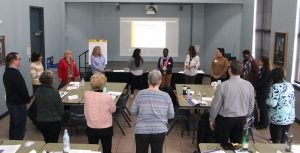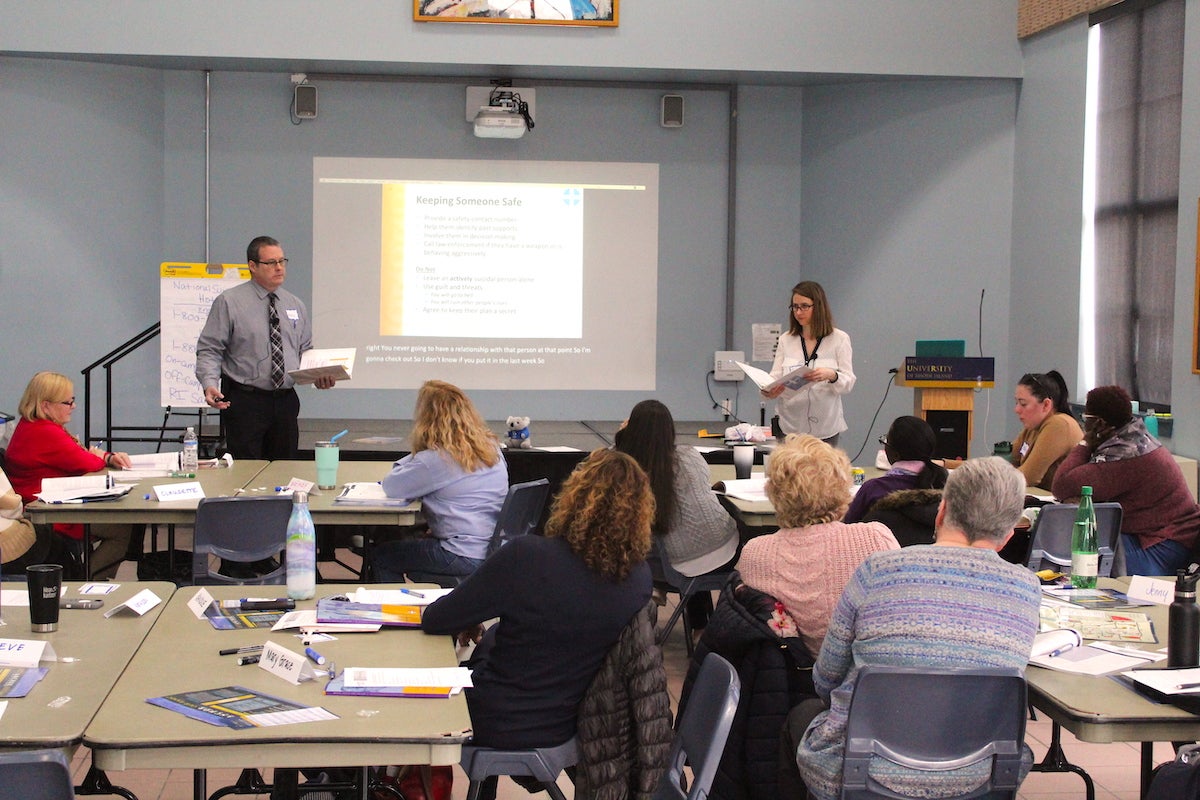Federal funds to expand ‘CPR for the mind’ training to thousands more on campus
Within the next couple years, as many as 2,500 more students, faculty and staff members will be equipped to provide “CPR for the mind” as the University of Rhode Island Psychological Consultation Center expands its Mental Health First Aid program, thanks to a $300,000 grant from the federal Substance Abuse and Mental Health Administration.
URI is the among first universities in the state to adopt Mental Health First Aid training, a comprehensive program that teaches people of all ages and walks of life to identify, understand and respond to signs of mental illness or distress. The training provides participants with mental health literacy on more common illnesses such as anxiety, depression and substance abuse, while also educating them about bipolar disorder, eating disorders, post-traumatic stress disorder and schizophrenia. The training includes videos and mock scenarios, and provides a step-by-step process to follow, which helps people stay calm, according to Lindsey Anderson, director of URI’s Psychological Consultation Center, part of the College of Health Sciences.
“The whole goal is about facilitating a conversation about mental health, about destigmatizing mental health,” Anderson said. “It’s about eliminating and minimizing the myths that often proliferate, the myths that stop people from seeking support for mental health that makes it harder to treat mental health issues. As a community, we have a responsibility to educate ourselves about those unique vulnerabilities, and the ways we can support people and each other in the mental health needs that we all have.”
 The program has already educated 1,300 members of the campus community since its inception two years ago. Over the course of the three-year grant, Anderson expects another 2,000-2,500 to be trained, including 600 faculty and staff members this year. The grant will also allow the Psychological Consultation Center to add to the number of mental health instructors, which is currently 10.
The program has already educated 1,300 members of the campus community since its inception two years ago. Over the course of the three-year grant, Anderson expects another 2,000-2,500 to be trained, including 600 faculty and staff members this year. The grant will also allow the Psychological Consultation Center to add to the number of mental health instructors, which is currently 10.
The curriculum also is expanding in include six additional content modules aimed to more directly address the specific risk factors that disproportionately affect vulnerable populations on campuses, including: the LGBTQ community, international or multicultural student groups, student veterans, members of the Greek system, student athletes, and students struggling with eating disorders or body image concerns. The expanded curriculum now qualifies as a one-credit course, which Anderson hopes to expand into a three-credit class that could even become a requirement for matriculating students.
“We heard students saying we want more of an opportunity to participate in this, to be trained in these areas. We are trying to be responsive to that,” Anderson said. “That’s why we developed the one-credit class and the students have communicated to us that they want a credit-bearing option. We are really paying attention to what are the unique vulnerabilities and the unique mental health needs of those particular populations, and growing and expanding the curriculum to really make sure we are paying attention to those particular groups.”
Each session lasts an hour and 15 minutes, and classes are located throughout the campus, generally on Monday and Tuesday afternoons and evenings. Faculty and staff sessions are also scheduled the first Friday of every month. Members of the campus community can visit the Psychological Consultation Center’s website or email mhfa@etal.uri.edu for more information or to sign up.
“It’s really geared toward everybody. This is the type of training that is important for everybody, particularly those people who have regular interaction with students,” Anderson said. “The team of instructors is such an amazing group of talented, committed professionals who are doing this work on top of their full-time jobs, because they are passionate and committed to making sure student welfare and student well-being is being addressed at every level on campus. We recognize mental health first aid is super important for everyone.”

